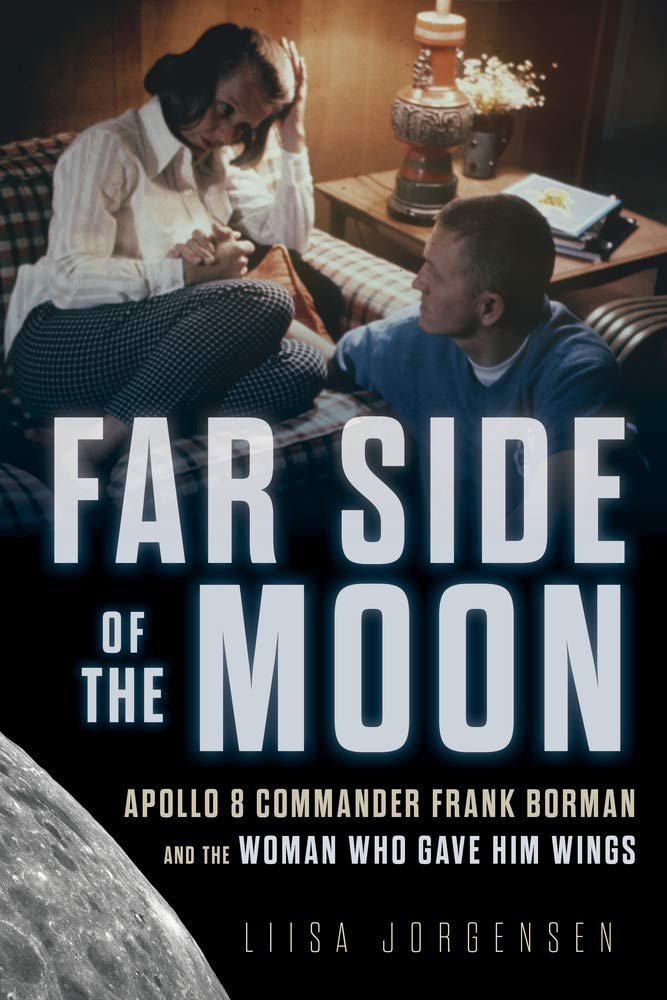Inspiration is a funny thing. It can come to us like a lightning bolt, through the lyrics of a song, or in the fog of a dream. Ask any writer where their stories come from and you’ll get a myriad of answers, and in that vein I created the WHAT (What the Hell Are you Thinking?) interview. Always including in the WHAT is one random question to really dig down into the interviewees mind, and probably supply some illumination into my own as well.
Today’s guest for the WHAT is Liisa Jorgensen, the author of Far Side of the Moon: Apollo 8 Commander Frank Borman and the Woman Who Gave Him Wings, the decades-long love story of a NASA commander and the leader of the Astronaut Wives Club.
Ideas for our books can come from just about anywhere, and sometimes even we can’t pinpoint exactly how or why. Did you have a specific origin point for your book?
I have worked as a story editor and production manager for an Emmy award winning film company for the last 20 years. We are always looking for unbelievable non-fiction stories, and I felt on a gut level that I found that when I came across Frank and Susan’s beautiful story. There have been many books written about the Apollo space program, but not through the eyes of the women and children that were experiencing it in a different way. I wanted to be the one to do that.
Once the original concept existed, how did you build a plot around it?
Because the book is non-fiction, the plot is essentially there. The challenge for me was to write it in a way that was accessible and engaging without getting up on a soapbox.
One of the reasons I was so passionate about writing Frank and Susan Borman’s story from Susan’s perspective is because I felt that she, along with all the other astronaut wives hadn’t been represented in the way I felt they should be. I related the most to Susan and couldn’t imagine how internally strong she had to be to hide her mental illness from everyone, because she truly had no choice. There was no one to talk to, and the shame that came with admitting something like that in the intense environment at NASA she lived with daily would eventually lead to her breakdown.
Have you ever had the plot firmly in place, only to find it changing as the story moved from your mind to paper?
I had to get Frank and Susan’s support to begin with, and when I got the green light on that I dived into the research. Because of that relationship and the doors that it opened, I was able to interview and speak candidly with the astronaut wives that are still with us. It was a privilege to talk to these amazing women. The idea never changed. I knew the story I wanted to tell.
Do story ideas come to you often, or is fresh material hard to come by?
Good writing is good storytelling conveyed in a way that is relevant to a variety of readers. I feel that one of the most difficult parts of starting the process to write a book is finding a story that will both inspire and help us become better humans. I tend to look for stories about strong women who have overcome immense challenges and have been over-shadowed by the men or circumstances in their lives. I also believe that a personal connection to what you are writing will keep you moving through the blocks, and those moments you want to quit.
How do you choose which story to write next, if you’ve got more than one percolating?
It must check all the boxes: an active human quest, emotional stakes that are very high along with trials and obstacles to overcome. The challenge for me as a non-fiction writer is that I can’t manufacture that, so it is a treasure hunt to find a story that meets each one of those metrics.
I have 6 cats and a Dalmatian (seriously, check my Instagram feed) and I usually have at least one or two snuggling with me when I write. Do you have a writing buddy, or do you find it distracting?
I absolutely do! She is sitting beside me right now as I am writing this. She is an adorable bichon/poodle and was born the day my book came out – December 7, 2021.
I named her SuSu, which is what Susan’s grandchildren called her, and Frank named every plane he owned SuSu as well. I have always loved animals and could not imagine my life without them.
Liisa Jorgensen has worked as a writer and story editor on a diverse variety of film and television productions for Myth Merchant Films for over 20 years. She believes in the power of story and its ability to help audiences transform and become better humans. She is especially interested in ending the stigmas associated with mental illness and disorders, as well as highlighting those who serve a greater good and live for something other than themselves. She lives in Edmonton, Alberta, Canada.




